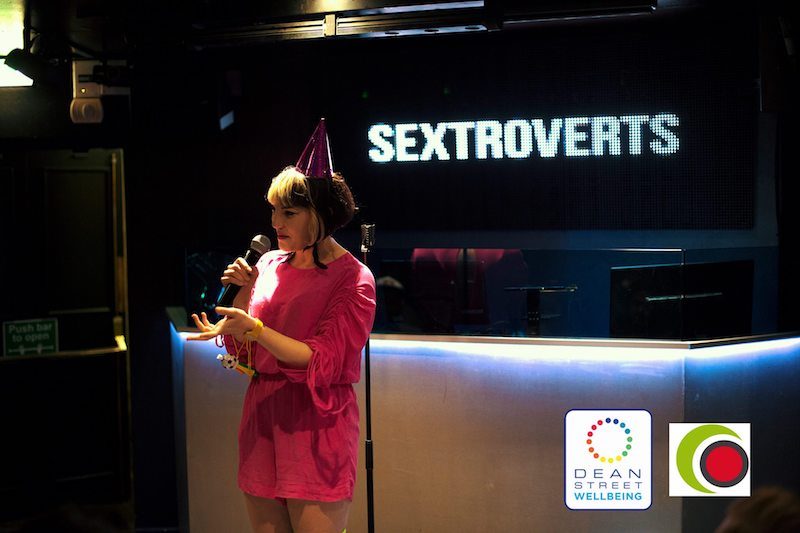Running a comedy night in a community space can be a conundrum
Bisexuality has resigned me to a lifetime of imposter syndrome.
I get the uncomfortable hit of it whenever there’s a raised eyebrow about me running an event in gay/lesbian spaces. I get it when I’m dating a man and presumed straight. I get it when I’m dating a woman and feel guilty for acknowledging that I’m also attracted to men.
I’ll probably get a big wallop of it at my own wedding, when I’ll feel like Louis Theroux in a dress, wandering around this alien subculture, confused about what all the little names on the napkins mean (it’s a queer wedding. It could be anything). I got it when I pretended my name was Stephanie Pompoms, who ran an illegal mink coat business for fifteen years, and avoided millions in tax through offshore accounts set up through twelve made-up email addresses. OK, in some cases, the imposter syndrome is justified. But you get the point.
Since September 2016 I have been hosting a monthly comedy night called Sextroverts, which began as a project with the sexual health clinic at 56 Dean Street. In collaboration with the fabulous David Stuart, whose claim to fame, amongst other notable things, is getting the word “ChemSex” into the Oxford English Dictionary, and my brilliant co-producer Catherine Darcy, we invite acts from across the LGBTQ, sex worker and sexual health community to do comedy about sexual wellbeing – whatever they do with their junk.
We want material about dildos, Grindr, fisting, barebacking, polyamory, kink, female ejaculation, orgies, everything. What always surprises me is that none of the things listed above ever offend people. What does offend people are the small sets of interactions – sometimes called “microagressions” – that pervade the queer community: for example, when acts stray into casual misogyny and transphobia, don’t check their privilege, are casually whorephobic, or creep into the much-maligned middle-class habit of policing other peoples’ language. It’s a whole Pandora’s Box of things you weren’t even aware were offensive, until you start spending time in queer spaces.
Sam Nicoresti​
As an avocado-carrying member of the millennial snowflake brigade, I am meticulous to a fault about making the space a refuge from the overt misogyny, homophobia, racism and transphobia that still exists on the comedy scene. But recently, I’ve decided it’s more important to let acts play a little bit more fast and loose, and worry less about offending people.
This might be a reaction to bisexual imposter syndrome – or trying to shed the self-censorship that can accompany the social conditioning of being female. I’ve come round to the idea that it’s not mutually exclusive to run a community space, and occasionally piss people off. Especially if, for instance, you are a queer woman talking honestly about sexuality, which is still something that so many outside forces try to control.
Running a comedy night in a community space is a conundrum, because if you can’t say things that will offend some people, you’ll get a bland, edited-to-nothing-ness performance that doesn’t represent anyone. The point of stand-up, specifically (apart from the obvious aim of making people laugh) is subjectivity: it gives the comedian license to tell us all the dirty details of their inner life, and the lived experience of being a human isn’t usually inoffensive.
My job as an MC is to make sure every act who gets up onstage has the best possible chance of smashing the gig, whatever their perspective. It doesn’t please everyone. That would be boring. But there wouldn’t be any point in running a gig “by queers, for queers” without acknowledging that nobody owns or defines queerness – and that a community isn’t a homogenous group, it’s a collection of individuals making hundreds of decisions a day about how to interact with each other. So our policy has evolved into: no policy, apart from asking a range of acts to be honest, funny and themselves.
The politics of the LGBTQ community are messy, complicated and difficult. So thank god we have comedy to answer the question “How do I make it all about me?” The aim of Sextroverts is to give a rich mix of LGBTQ performers the breathing space to tell us what their lives are actually like, and what they are really thinking.
I live in constant angst about managing the complex sensitivities within the space (it doesn’t usually show because, after all – I am bisexual, and therefore naturally good at keeping things invisible). But despite my anxieties, the complexity always makes for a much more interesting, vibrant, and irreverent show.
Our aim from the beginning was to create a space where performers can be fierce, honest, and disagree with each other. As a community, I hope it brings us together to have better dialogue about sexual wellbeing, with more kindness towards each other, and a better sense of humour.
Sextroverts is generously supported by Wandsworth Oasis, and part of the 56 Dean Street Wellbeing Programme. The next performances are at Ku Bar Leicester Square on 18 April and June 13. More details can be found on Facebook: @sextrovertscomedy.
Only reading DIVA online? You're missing out. For more news, reviews and commentary, check out the latest issue. It's pretty badass, if we do say so ourselves.
divadigital.co.uk // divadirect.co.uk
